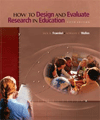 |
1 |  | 
Researchers who focus on the study of culture take which approach to qualitative research? |
|  | A) | grounded theory |
|  | B) | phenomenology |
|  | C) | case study |
|  | D) | ethnography |
 |
 |
2 |  | 
Which of the following research study titles is most likely the title for an ethnographic study? |
|  | A) | Effects of Team Teaching on High School Student Performance |
|  | B) | Relationships of Arts Integration to Student Attendance and Behavior |
|  | C) | Social Structure and Familial Influences of Company-Sponsored Day Care |
|  | D) | Attitudes and Perceptions of Inner-City School District Superintendents |
 |
 |
3 |  | 
Ethnographic procedures require which three things? |
|  | A) | a detailed description of the culture-sharing group being studied, an analysis of this group in terms of perceived themes of perspectives, and an interpretation of the group by the researcher as to meanings and generalizations about the social life of human beings in general |
|  | B) | a detailed description of the culture-sharing group being studied, an analysis of this group in terms of perceived themes of perspectives, and a relic that the researcher studies |
|  | C) | a detailed description of the culture-sharing group being studied, an analysis of this group in terms of social groups, and an interpretation of the group by the researcher as to meanings and generalizations about the social life of human beings in general |
|  | D) | reliability and validity are irrelevant |
 |
 |
4 |  | 
Ethnographic research has a particular strength that makes it especially appealing to many researchers. This strength is that |
|  | A) | it takes a relatively short time to research. |
|  | B) | it can reveal nuances and subtleties that other methodologies miss. |
|  | C) | there is no need to control for threats to internal validity. |
 |
 |
5 |  | 
Which concept is the sum of a social group's observable patterns of behavior, customs, and ways of life and comprises the ideas, beliefs, and knowledge that characterize a particular group? |
|  | A) | holistic outlook |
|  | B) | culture |
|  | C) | contextualization |
|  | D) | emic perspective |
 |
 |
6 |  | 
When researchers describe as much as they can about the culture of a group, trying to gain some idea of the group's history, social structure, politics, religious beliefs, symbols, customs, rituals, and environment, they provide a(n) |
|  | A) | description of culture. |
|  | B) | emic perspective. |
|  | C) | holistic outlook. |
|  | D) | contextualization. |
 |
 |
7 |  | 
When a researcher places what he has seen and heard into a larger perspective, he is providing |
|  | A) | contextualization. |
|  | B) | description of culture. |
|  | C) | holistic outlook. |
|  | D) | emic perspective. |
 |
 |
8 |  | 
When an ethnographic researcher presents the external, scientific objective perspective on reality, she provides |
|  | A) | emic perspective. |
|  | B) | contextualization. |
|  | C) | etic perspective. |
|  | D) | description of culture. |
 |
 |
9 |  | 
When an ethnographic researcher presents an insider's perspective of reality, he provides |
|  | A) | etic perspective. |
|  | B) | emic perspective. |
|  | C) | description of culture. |
|  | D) | contextualization. |
 |
 |
10 |  | 
The most serious mistake that an ethnographer can make is |
|  | A) | refraining from making value judgments about unfamiliar practices. |
|  | B) | presenting what he has seen and heard into a larger perspective. |
|  | C) | describing the sum of a social group's observable patterns of behavior, customs, and ways of life or the ideas, beliefs, and knowledge that characterize a particular group. |
|  | D) | imposing her own culture's standards of behavior and values onto those of another culture. |
 |
 |
11 |  | 
Two major means of data collection in ethnographic research are |
|  | A) | participant observation and interviewing. |
|  | B) | testing and observation. |
|  | C) | survey and testing. |
|  | D) | survey and observation. |
 |
 |
12 |  | 
A researcher's written account of what he hears, sees, experiences, and thinks in the course of collecting and reflecting on data describes her |
|  | A) | field jottings. |
|  | B) | field notes. |
|  | C) | field diary. |
|  | D) | field log. |
 |
 |
13 |  | 
A personal statement of the researcher's feelings, opinions, and perceptions about others with whom the researcher comes in contact during the course of his work describes his |
|  | A) | field diary. |
|  | B) | field jottings. |
|  | C) | field notes. |
|  | D) | field log. |
 |
 |
14 |  | 
In ethnographic research, hypotheses: |
|  | A) | are usually stated at the outset. |
|  | B) | may emerge as the study progresses. |
|  | C) | are never stated. |
|  | D) | are irrelevant. |
 |
 |
15 |  | 
Key events refers to events that |
|  | A) | occur only in unique social groups. |
|  | B) | do not convey much information. |
|  | C) | ethnographic researchers can use to describe and analyze an entire culture. |
|  | D) | change a culture in important ways. |
 |



 2003 McGraw-Hill Higher Education
2003 McGraw-Hill Higher Education